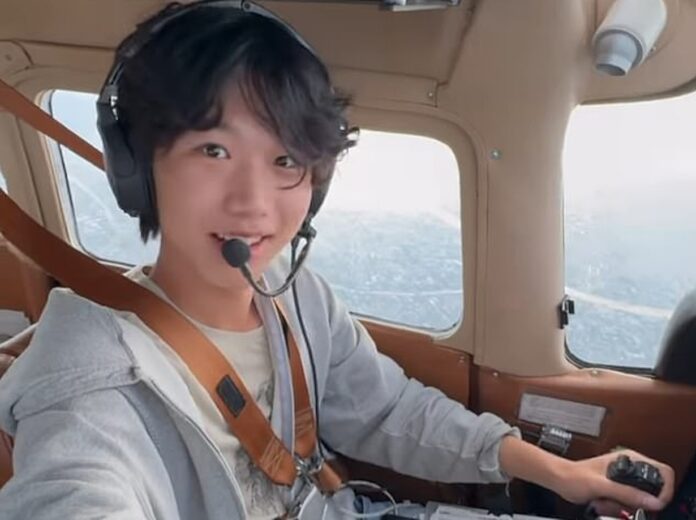- Ethan Guo, 20, has been stranded in Antarctica for over five weeks after an unauthorized solo flight.
- Chilean authorities charged him with providing false flight information. Charges were dropped after a $30,000 charity donation and a three-year ban.
- Harsh winter conditions and an unfit aircraft have kept him grounded, highlighting the risks of extreme solo travel.
A 20-year-old American influencer has found himself stuck in one of the most remote and unforgiving corners of the world. This happened after an unauthorized flight to Antarctica. Ethan Guo, who set out to become the youngest person to fly solo to all seven continents, has been stranded. He is at a Chilean military base for more than five weeks, as harsh Antarctic winter conditions and aviation restrictions keep him grounded.
Guo’s journey began in Memphis, Tennessee. It had already taken him across North America, South America, Europe, Asia, Africa, and Australia. The final leg of his ambitious mission—reaching Antarctica—took a dangerous turn. He landed at a Chilean-controlled station in the southernmost reaches of the continent in June. Authorities say he did so without permission, sparking legal action that has made headlines around the globe.
Unauthorized Flight Sparks Legal Trouble
Chilean prosecutors charged Guo on June 29 with submitting false flight plan information to aviation authorities. According to officials, his filed plan only indicated a stopover in Punta Arenas, a city in southern Chile. Instead, Guo continued farther south in his single-engine Cessna 182Q. This aircraft is typically used for shorter regional trips, and he touched down on Antarctic territory without authorization.
Prosecutor Cristián Crisosto described the Cessna as “unsuited” for such a mission, emphasizing the aircraft’s limitations in extreme polar conditions. “It simply does not have the capabilities to safely make this flight,” he said.
The move drew widespread criticism from aviation experts and the public alike. Many online commentators questioned Guo’s decision, labeling it reckless. They pointed out the dangers not only to himself but also to the Chilean authorities who might have to assist in emergencies. Antarctica is one of the world’s most isolated regions.
Legal Resolution Comes With Conditions
After weeks of uncertainty, Guo’s legal troubles have formally eased. On Monday, a Chilean judge approved a deal between prosecutors and Guo’s lawyers. This deal dismissed the criminal charges under strict conditions.
Guo must donate $30,000 to a children’s cancer charity within 30 days. He is also required to leave Chile immediately and refrain from returning for three years. The agreement has brought relief for Guo. He said in a message to the Associated Press that he feels “relieved by the outcome” but is still waiting for permission to fly out of Antarctica. “I sincerely hope they give it to me soon. I and my plane can continue with my original mission,” he said.
Even with legal clearance, Guo’s situation is far from resolved. Regular flights out of the Antarctic region remain grounded due to severe winter weather. Moreover, his own aircraft has been deemed unfit for travel by Chilean authorities. This leaves him reliant on official evacuation or resupply flights.
A Risky Pursuit of a Global Dream
Guo’s story highlights the extreme risks some adventurers are willing to take in pursuit of world records and personal challenges. Speaking to KTVU in May, before reaching Antarctica, Guo admitted that fear had often shadowed his journey. “To be honest, many times I am scared,” he said. “It’s not a guarantee that I’ll be able to complete this journey and on many fronts there are risks.”
Despite the dangers, Guo remained committed to his dream. “But I think if you have something that you believe in and you find something that is worth fighting for, even with the risk, you should take it on,” he explained. He encouraged others to pursue their ambitions. Break large goals into smaller, manageable steps and advance steadily, no matter the obstacles.
Public Reaction and Debate
Guo’s ordeal has sparked a mix of fascination and criticism. On social media, some users praised his determination and adventurous spirit, calling him an inspiration for young travelers and record-seekers. Others, however, condemned the reckless decision. Flying to a restricted area with inadequate equipment pointed out the potential strain on rescue services and the dangers posed by Antarctic weather.
Experts in polar aviation have been particularly vocal, warning that light aircraft are extremely vulnerable in extreme conditions. “Antarctica is not a place for amateur pilots with single-engine planes,” one analyst commented. “Weather can change in minutes, and even small mechanical issues can become life-threatening.”
The Challenges of Antarctic Survival
Living at a Chilean military base in Antarctica is far from comfortable. Temperatures can drop dramatically, with strong winds and snowstorms making outdoor activity perilous. For six weeks, Guo has remained confined to the base. He relies on military support and limited supplies while waiting for clearance to depart.
The experience has been both isolating and eye-opening. For an influencer used to sharing adventures online, the isolation has likely been a stark reminder. Personal ambition has limits when confronted by nature’s extremes. While details of his daily life at the base remain sparse, it’s clear that patience and endurance are now central to his journey.
A Lesson in Preparation and Consequence
Guo’s experience serves as a cautionary tale for adventurers eager to push boundaries without adequate preparation. While the thrill of exploration and record-setting is enticing, it comes with responsibility. Filing accurate flight plans, using appropriate aircraft, and following international regulations are not just bureaucratic hurdles. They can mean the difference between a successful mission and a dangerous, potentially life-threatening situation.
Authorities hope the resolution of Guo’s case reinforces the importance of proper planning and adherence to rules in extreme environments. The combination of legal consequences, logistical challenges, and public scrutiny highlights the stakes involved in attempting extraordinary feats in areas as harsh as Antarctica.




